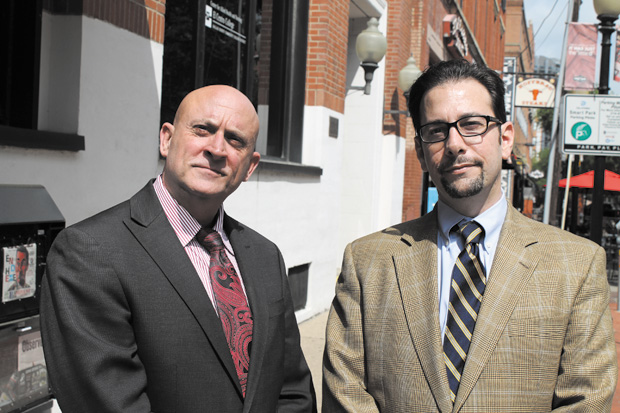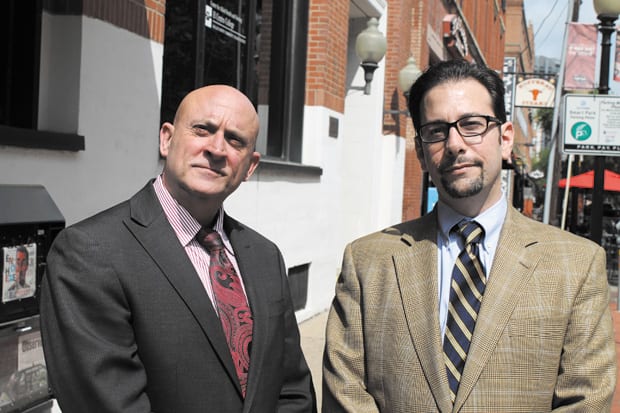The national AIDS nonprofit with a local clinic filed suit after being denied Ryan White funding

Bret Camp, left, and Jonathan Petrus discussed the AHF lawsuit against Dallas County after the county commissioners meeting on March 31. (David Taffet/Dallas Voice)
DAVID TAFFET | Senior Staff Writer
AIDS Healthcare Foundation has sued Dallas County after being denied any portion of the county’s Ryan White funding. That money comes from the federal government and is distributed by the county to agencies that provide HIV/AIDS medical and other support services.
AHF applied for funding in four categories — outpatient medical services, medical case management, case management and local drug reimbursement.
Parkland Hospital gets the largest amount of the $14 million in Ryan White dollars allocated to Dallas County for patient care and pharmacy. Both large and small nonprofit agencies also share in the funding to provide medical care, transportation, food, drugs, counseling and legal help.
The current grant period began on March 1, but no funds have been distributed yet in this cycle.
County commissioners have final approval of the distribution of funds. At their March 31 meeting, County Judge Clay Jenkins noted that the grant is “under litigation” and called an executive session.
But before going into executive session, the commission heard from two speakers, including Raul Ramirez.
Ramirez said his mother is HIV-positive, and that before AHF opened its north Dallas clinic, she struggled against a lack of access to care and a language barrier. AHF’s patient care, he said, is “on point.”
The commission didn’t reconvene after executive session to announce any monetary awards.
If the Ryan White funds are not distributed soon, “agencies could close,” said the director of one local AIDS agency, asking to remain anonymous for fear of reprisals by the county.
Another, who also asked for anonymity, echoed that statement and said most agencies might make it three months before having to borrow money.
If the agencies were forced to borrow money, the principle could be repaid once Ryan White money was awarded, but interest incurred because of the delay would not be covered by the grants.
Once Ryan White grants are awarded, the county takes six weeks to two months to pay for services billed.
Los Angeles-based AHF opened its first clinic in Texas in August 2012. The organization started as an AIDS hospice, according to CFO Jonathan Petrus. Once medications became available to control the HIV virus, the agency began providing medical care.
Today, AHF serves more than 400,000 patients in 36 countries at 245 clinics. In the U.S., it operates 43 clinics in 13 states and in Washington D.C.
Its projected budget for 2015 is $1.1 billion.
In its lawsuit against Dallas County, AHF points out, “As the largest provider of HIV/AIDS medical care in the United States, AHF has always met the requirements for receipt of program funds in the other states where AHF operates.”
On March 2, AHF received notification that its “vendor certification requirement forms did not meet the specifications,” which disqualified AHF’s bid for Ryan White dollars.
In the letter from the district attorney’s office, the agency was told it didn’t submit a “certificate of registration” from the Texas Secretary of State. AHF claims that the request for proposal didn’t require that document, but does request a “certificate of status.”
According to AHF Texas Regional Director Bret Camp, neither document exists.
The letter pointed out several other items missing from the grant application, but AHF said they were not documents requested in the RFP.
At a meeting with the Dallas County purchasing department, AHF was told all applicants had to be incorporated for at least three years and had to be incorporated in the state of Texas. AHF opened its Dallas clinic at Medical City in December 2012.
According to the lawsuit, after AHF notified the district attorney’s office it planned to challenge the disqualification, “the justification for denying AHF Program grant funds shifted from disqualification to a poor evaluation.”
Petrus said AHF didn’t receive a bad evaluation.
“There’s clearly room for more providers in Dallas,” Petrus said.
He said AHF’s model was simple. Identify individuals who are positive, link them into the system and give them the best integrated care available without regard for ability to pay.
He said that based on national estimates, there are about 7,500 people out of care in Dallas County — 3,400 who are unaware of their HIV status and 4,000 who are aware but still not in care.
Camp said AHF has aggressively searched for people who are out of care, providing free HIV testing at its Out of the Closet resale store on Cedar Springs Road and in its mobile testing unit. He said very few of the north Dallas clinic’s 700 patients came from other agencies.
Petrus said he hopes the lawsuit prompts the county to re-evaluate its position and include AHF in its awards, because he doesn’t believe litigation would be good for either side.
AIDS service organizations are split on whether AHF should receive funding.
One agency spokesperson said AHF provides good patient care and favored the agency receiving funds. But another said his agency’s understanding of the three-year rule indicates that it would disqualify AHF.
But both agreed that delaying Ryan White awards more than another month or two could seriously damage both large and small AIDS agencies across the county.
This article appeared in the Dallas Voice print edition April 3, 2015.











